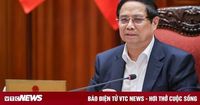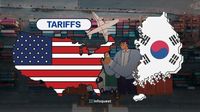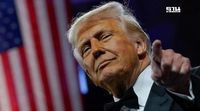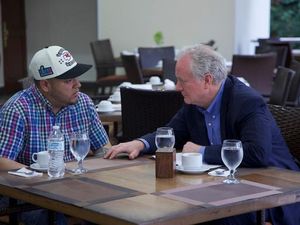On April 10, 2025, Chong In-kyo, a high-ranking trade official from South Korea, expressed optimism regarding trade relations with the United States following President Donald Trump’s recent decision to suspend reciprocal tariffs. This move is seen as a potential boost for trade amid a global economic slowdown.
Chong, who traveled to Washington for discussions with U.S. officials, highlighted the importance of negotiating lower import tariffs on goods from the U.S. after Trump had previously announced a 25% tariff on South Korean imports. The South Korean Ministry of Trade confirmed that Chong met with U.S. Trade Representative Jameson Greer to discuss these critical tariff issues.
On April 9, Trump announced the temporary suspension of reciprocal tariffs that had been set to take effect against several countries, while still planning to impose higher tariffs on China to increase pressure on the nation. The suspension is set to last for 90 days, providing a crucial window for the incoming South Korean administration, which will be elected in early June, to negotiate tariff reductions.
Chong described the suspension as a positive signal but emphasized the need for rapid discussions with the U.S. to mitigate potential negative impacts on South Korea’s economy, which heavily relies on exports. He noted that South Korea must also consider its exports to China and the various repercussions that may arise from these tariff policies.
Choi Sang-mok, South Korea’s Finance Minister, assessed that the pressure from tariffs has somewhat eased following the news of Trump’s temporary suspension. However, Trump will continue to enforce a base tariff of 10% on goods from all countries, alongside a 25% tariff on crucial exports from South Korea, including automobiles, auto parts, steel, and aluminum.
In light of these developments, South Korea is adopting a strategic approach to navigate the complexities of the new tariff landscape. Rather than retaliating aggressively or aligning with U.S. competitors, South Korea is opting for careful negotiations. Han Duck-soo, the acting Prime Minister of South Korea, spoke with Trump just hours before the new tariffs were set to take effect, marking their first communication in five months since the impeachment of former President Yoon Suk-yeol.
This 28-minute phone call focused on key trade topics such as trade balance, shipbuilding, liquefied natural gas (LNG), the Alaska gas pipeline project, and defense spending. The discussions underscored South Korea’s willingness to compromise on various fronts to lessen the impact of tariffs and maintain its relationship with the U.S.
Notably, Trump has emphasized a concept he refers to as "One Stop Shopping," which he described as "beautiful and efficient" through his social media platform, Truth Social. This approach suggests integrated negotiations that encompass not only tariffs but also security, energy, and cross-border investment projects.
In response, Chong swiftly traveled to Washington to propose a "big deal package," which includes increasing LNG imports from the U.S. and collaborating on the $44 billion Alaska LNG project, as well as discussing U.S. military cost-sharing arrangements in South Korea. Despite this clear path of negotiation, South Korea has firmly stated that it will not align with China or Japan to counter the U.S.
In an interview with CNN, Han reaffirmed, "South Korea will not join forces with China or Japan against the U.S.," despite previous trilateral ministerial meetings held in Seoul. He clarified that such meetings were routine and not aimed at forming a political alliance.
Instead of retaliating with reciprocal tariffs, South Korea believes such actions would harm its own economy and undermine confidence in its financial markets. At that time, South Korea’s stock market had already dropped 20% from its mid-year peak, and the won had reached its lowest point since the financial crisis.
As Trump resumes his global trade strategy, many countries are responding with aggressive measures or fragmented negotiations. However, South Korea is proposing a new approach that combines multifaceted negotiations into a single framework, emphasizing issues that Trump prioritizes, such as LNG, energy projects, and military costs. This strategy shifts the focus from South Korea's trade deficit to mutual benefits that the U.S. cannot overlook.
Although a final deal has yet to be finalized, South Korea has achieved initial success by temporarily halting the bleeding from tariffs and opening avenues for negotiations that could transform a crisis into an opportunity. The key lesson from South Korea’s approach is that in a world where the U.S., under Trump, uses trade as a strategic bargaining tool, presenting creative proposals, engaging proactively in negotiations, and offering mutually beneficial alternatives can empower smaller nations to navigate the challenges posed by larger powers.
In a related context, Vietnam is also responding to the evolving trade landscape. During the 4th meeting of the Joint Committee on Economic Cooperation on April 10, Prime Minister Pham Minh Chinh emphasized the importance of timely and effective policy responses to the current complex situation.
The Prime Minister noted that the success of Vietnam's earlier trade discussions with the U.S. aimed to reduce trade deficits and foster sustainable development, highlighting the need to maintain stability in various sectors, including investor confidence and political stability.
Chinh pointed out that Vietnam must continue to adjust its economic structure to be more sustainable while promoting high-quality foreign direct investment and reducing reliance on any single market. He underscored the necessity of leveraging the 17 free trade agreements signed with over 60 markets worldwide to enhance economic cooperation.
As Vietnam navigates its own trade challenges, the Prime Minister called for coordinated efforts between monetary and fiscal policies to ensure effective responses to changing economic conditions. He also urged the need for rapid implementation of tax relief measures and the reduction of bureaucratic hurdles to facilitate business operations.
The Prime Minister's proactive stance reflects a broader strategy to enhance Vietnam's role in international trade while addressing domestic economic concerns. By focusing on comprehensive cooperation and sustainable development, both South Korea and Vietnam are positioning themselves to thrive amid the complexities of global trade.






